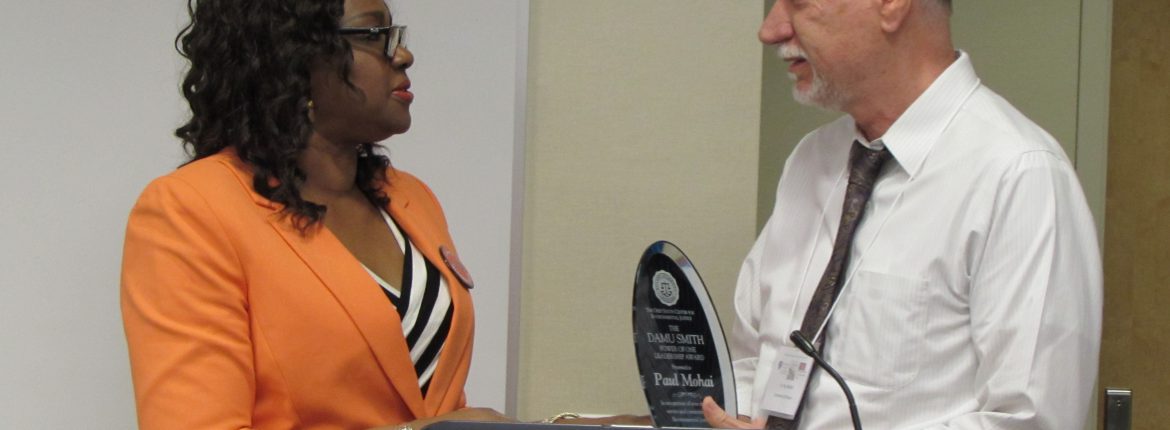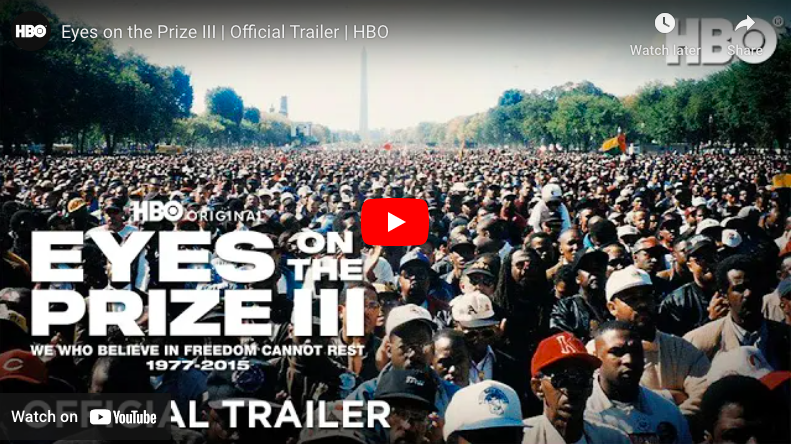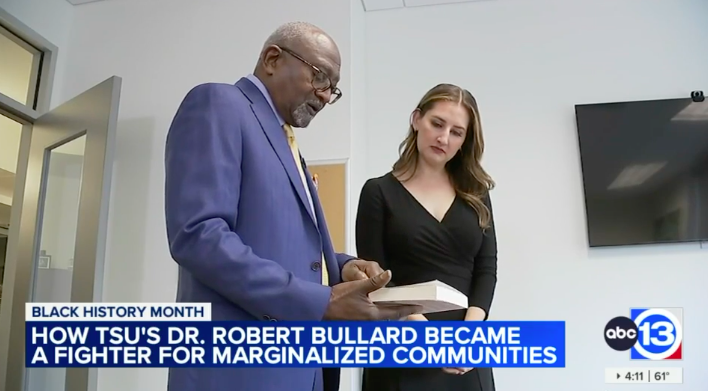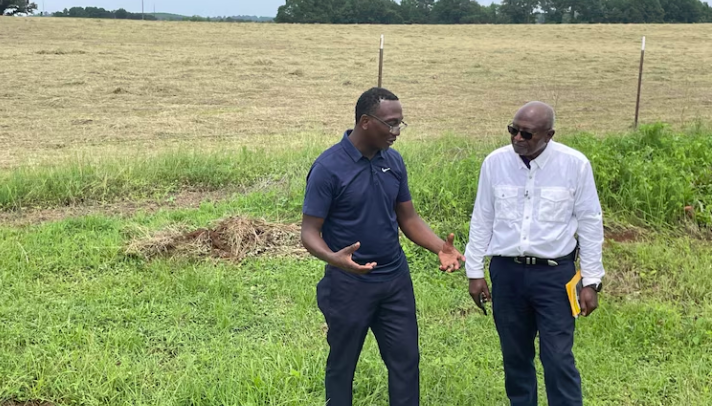 This past Saturday Paul Mohai received the 2014 Damu Smith Power of One Leadership Award presented at the Second Annual HBCU Student Climate Change Conference held at Dillard University in New Orleans April 17-19. The conference was co-sponsored by Dillard University Deep South Center for Environmental Justice and the Barbara Jordan-Mickey Leland School of Public Affairs at Texas Southern University. Dr. Mohai is a professor in the University of Michigan School of Natural Resources and Environment. He co-founded the School’s Environmental Justice Program, in which he is a field coordinator. He received his PhD in environmental sociology and environmental/natural resource policy from Penn State University.
Back in 1990, he along with his colleagues organized a conference titled, “Race and the Incidence of Environmental Hazards,” out of which grew the creation of the “Michigan Coalition,” an ad hoc group that pressured federal agencies, including the EPA, to make environmental justice a national priority. It was those advocacy efforts that inspired the formation of EPA’s Office of Environmental Justice. And in 1992, he co-edited with Professor Bunyan Bryant Race and the Incidence of Environmental Hazards: A Time for Discourse, the second book on environmental justice. Professor Mohai served on the National Advisory Committee for the First National People of Color Environmental Leadership Summit and was one of the original members of the EPA National Environmental Justice Advisory Committee or NEJAC in the mid-1990s.
His teaching and research interests have bee laser focused on environmental justice, public opinion and the environment, and influences on environmental policy making. A Principal Investigator of the 1990 and 2002 Detroit Area Studies (DAS), Professor Mohai has sought to understand the root causes of environmental concern and why such concern has become a worldwide phenomenon. He co-authored Toxic Wastes and Race at Twenty: 1987-2007 report, the 20th anniversary update to the historic and influential 1987 Toxic Wastes and Race in the United States report.
Because of his longtime interest, work, and leadership in the field of Environmental Justice, Dr. Mohai was again invited in 2007 to become a member of the U.S. Environmental Protection Agency's (EPA) National Environmental Justice Advisory Council (NEJAC). Dr. Mohai also received the 2012 Bunyan Bryant Environmental Justice Award from the Michigan Chapter of the Sierra Club for helping to characterize the extent and impact of unequal burdens borne by communities in Detroit and neighboring areas. In 2013, he was awarded the Harold R. Johnson Diversity Service Award from U-M in recognition of his leadership in the environmental field and for dedication to developing cultural and ethnic diversity at the university.
Dr. Mohai’s teaching and research interests are focused on environmental justice, public opinion and the environment, and influences on environmental policy making. Throughout his long and illustrious career, his research and policy work has examined the causes of disproportionate pollution burdens in low-income and people of color communities; the role of environmental factors in explaining racial and socioeconomic disparities in health; the nature of public attitudes, both domestically and internationally, toward environmental and resource issues and how these change over time; the factors contributing to citizen activism; and the nature of interest-group behavior and influence on policy making. The Environmental Justice Movement has progressed over the past three decades because of his expertise, hard work and dedication. We salute you Dr. Mohai.
This past Saturday Paul Mohai received the 2014 Damu Smith Power of One Leadership Award presented at the Second Annual HBCU Student Climate Change Conference held at Dillard University in New Orleans April 17-19. The conference was co-sponsored by Dillard University Deep South Center for Environmental Justice and the Barbara Jordan-Mickey Leland School of Public Affairs at Texas Southern University. Dr. Mohai is a professor in the University of Michigan School of Natural Resources and Environment. He co-founded the School’s Environmental Justice Program, in which he is a field coordinator. He received his PhD in environmental sociology and environmental/natural resource policy from Penn State University.
Back in 1990, he along with his colleagues organized a conference titled, “Race and the Incidence of Environmental Hazards,” out of which grew the creation of the “Michigan Coalition,” an ad hoc group that pressured federal agencies, including the EPA, to make environmental justice a national priority. It was those advocacy efforts that inspired the formation of EPA’s Office of Environmental Justice. And in 1992, he co-edited with Professor Bunyan Bryant Race and the Incidence of Environmental Hazards: A Time for Discourse, the second book on environmental justice. Professor Mohai served on the National Advisory Committee for the First National People of Color Environmental Leadership Summit and was one of the original members of the EPA National Environmental Justice Advisory Committee or NEJAC in the mid-1990s.
His teaching and research interests have bee laser focused on environmental justice, public opinion and the environment, and influences on environmental policy making. A Principal Investigator of the 1990 and 2002 Detroit Area Studies (DAS), Professor Mohai has sought to understand the root causes of environmental concern and why such concern has become a worldwide phenomenon. He co-authored Toxic Wastes and Race at Twenty: 1987-2007 report, the 20th anniversary update to the historic and influential 1987 Toxic Wastes and Race in the United States report.
Because of his longtime interest, work, and leadership in the field of Environmental Justice, Dr. Mohai was again invited in 2007 to become a member of the U.S. Environmental Protection Agency's (EPA) National Environmental Justice Advisory Council (NEJAC). Dr. Mohai also received the 2012 Bunyan Bryant Environmental Justice Award from the Michigan Chapter of the Sierra Club for helping to characterize the extent and impact of unequal burdens borne by communities in Detroit and neighboring areas. In 2013, he was awarded the Harold R. Johnson Diversity Service Award from U-M in recognition of his leadership in the environmental field and for dedication to developing cultural and ethnic diversity at the university.
Dr. Mohai’s teaching and research interests are focused on environmental justice, public opinion and the environment, and influences on environmental policy making. Throughout his long and illustrious career, his research and policy work has examined the causes of disproportionate pollution burdens in low-income and people of color communities; the role of environmental factors in explaining racial and socioeconomic disparities in health; the nature of public attitudes, both domestically and internationally, toward environmental and resource issues and how these change over time; the factors contributing to citizen activism; and the nature of interest-group behavior and influence on policy making. The Environmental Justice Movement has progressed over the past three decades because of his expertise, hard work and dedication. We salute you Dr. Mohai.Dr. Robert D. Bullard is featured in HBO Original Six-Part Documentary Series
Dr. Robert Bullard, the creator of the environmental justice movement,...





